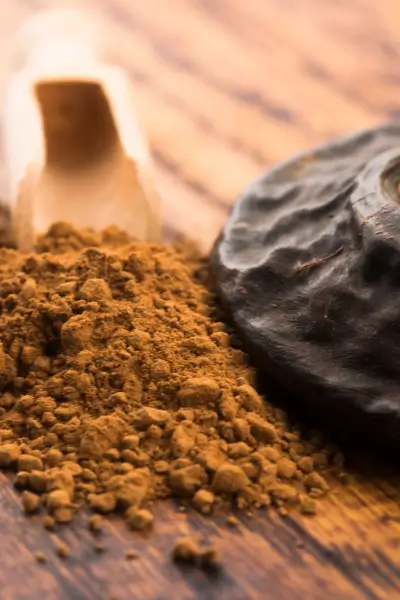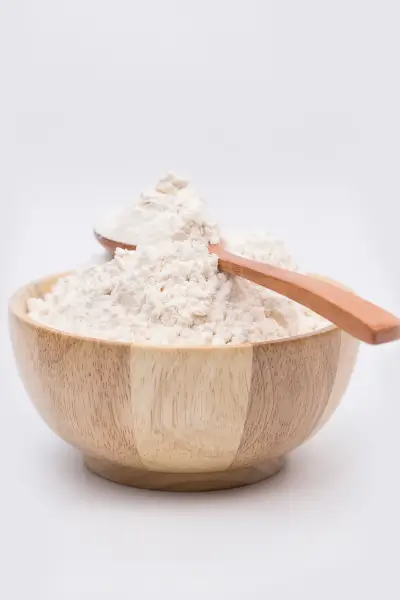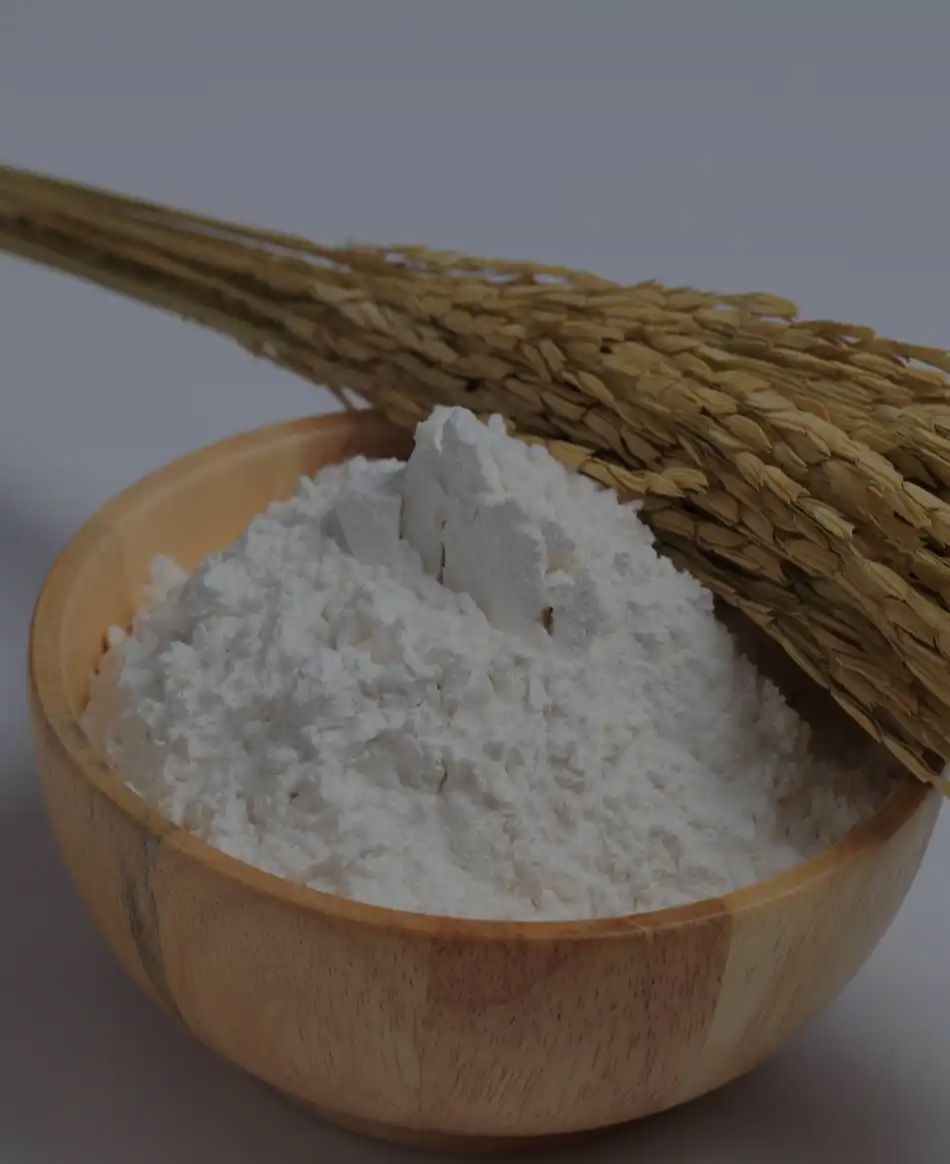Guar Gum
Guar Gum
Guar gum is a natural polysaccharide derived from the seeds of the guar plant (Cyamopsis tetragonoloba), primarily grown in arid regions of India and Pakistan. Known for its exceptional thickening, gelling, and stabilizing properties, guar gum is a vital ingredient across various industries, including food, pharmaceuticals, cosmetics, and industrial applications. Its unique chemical structure allows it to form highly viscous solutions, making it an ideal choice for enhancing texture and stability in various products.
Guar gum is composed mainly of the galactomannan polysaccharide, which consists of a backbone of mannose units with galactose side chains. This configuration contributes to its water-soluble nature and ability to form viscous gels when hydrated. The molecular weight of guar gum can vary significantly, affecting its thickening efficiency and viscosity.
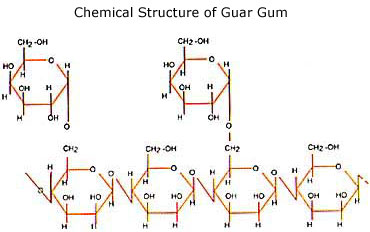
| Guar Gum Powder Standards |
|---|
| HS-Code - 130 232 30 |
| CAS No. - 9000-30-0 |
| EEC No. - E 412 |
| BT No.-1302 3290 |
| EINECS No. - 232-536-8 |
| Imco Code - Harmless |
Process
The manufacturing process of guar gum begins with harvesting seeds from the guar plant, followed by drying and cleaning to eliminate impurities. The seeds undergo dehulling to remove the outer shell, yielding guar splits, which are then milled into a fine powder. This powder is hydrated with water to create a gel-like consistency, and it may be dried again for packaging. Throughout the process, quality control measures ensure the product meets industry standards. The final guar gum is then packaged for distribution, serving a variety of applications in the food, pharmaceutical, and industrial sectors.

Specification & SDS
Application
Food & Beverage
Guar gum is widely used as a thickening agent, enhancing viscosity in various formulations. It serves as a stabilizer for emulsions and improves texture in a range of products. Additionally, it provides structure and elasticity in gluten-free applications, highlighting its versatility across multiple industries.
Pharmaceutical
Guar gum serves as a binder in tablet formulations, ensuring ingredient cohesion and dosage uniformity. It also acts as a suspending agent, preventing solid particles from settling in liquids, thus enhancing stability and efficacy. Its natural properties make it ideal for various medicinal formulations, including controlled-release applications.
Cosmetics and Personal Care
Guar gum is a vital ingredient in cosmetics and personal care products, where it enhances the texture and viscosity of lotions, creams, and gels. Its thickening properties also improve formulation stability and consistency, making it effective in hair care products for enhancing manageability and adding body.
Oil Well Drilling and Fracturing
Guar gum is important in oil drilling and fracturing. It is used in drilling fluids to thicken them, which helps keep materials suspended and reduces fluid loss during the fracturing process. This improves drilling efficiency and keeps the fluid stable in challenging rock formations.
Explosives
Guar gum is used in the explosives industry as a thickening and stabilizing agent for emulsion explosives. It improves the consistency and performance of the mixture, ensuring better detonation and stability during storage. Additionally, it enhances water resistance, making emulsions more effective in various conditions while contributing to safer production processes.
Paper
Guar gum is used in the paper industry as an additive to enhance the strength and quality of paper products. It improves fiber retention, resulting in smoother surfaces and better printability, while also controlling viscosity in the pulp to enhance the overall efficiency of the papermaking process.
Fast Hydrating Guar Gum
Fast Hydrating Guar Gum
What is Fast Hydrating Guar Gum:
Fast hydrating guar gum is an advanced form of Guar gum specifically designed for rapid water absorption and swelling, resulting in a gel-like consistency. This characteristic makes it highly effective in applications that require quick thickening or gelling, including food formulations, pharmaceuticals, and various industrial processes. Fast hydrating guar gum is often the preferred choice for applications demanding efficiency and immediate results, ensuring optimal performance across diverse sectors.
Why Fast Hydrating Guar Gum Is Used In Oil And Gas Industry
Fast hydrating guar gum is widely used in the oil and gas industry due to its ability to quickly increase viscosity in drilling fluids and hydraulic fracturing applications. This rapid hydration helps create a thickened fluid that effectively suspends proppants and other solid materials, improving their transport to targeted formations. Additionally, the quick gelling properties enhance the stability and performance of the fluid, reducing fluid loss and maintaining efficiency during drilling and fracturing operations. Its natural origins and eco-friendly characteristics also make it a preferred choice in an industry increasingly focused on sustainable practices.

Specification & SDS
Application
Oil and Gas Industry
It used to rapidly hydrate fracking fluids, improve drilling fluid viscosity, and assist in proppant suspension and well stimulation processes.
Food and Beverages
It helps improve texture, thicken liquids rapidly, and stabilize emulsions in products such as dressings, beverages, and dairy-based foods.
Pharmaceuticals
Fast Hydrating Guar Gum is used to quickly thicken suspensions, stabilize formulations, and improve the texture of creams, gels, and liquid medications.
Agriculture
It enhances agricultural efficiency by improving soil moisture retention, promoting seed germination, ensuring effective distribution of fertilizers and pesticides, and reducing soil erosion in hydroseeding.
Modified Guar Gum
Modified Guar Gum
Modified guar gum refers to guar gum that has been chemically or physically altered to enhance its properties for specific applications. These modifications can improve solubility, viscosity, and stability under varying conditions, making modified guar gum suitable for a wider range of uses.
Key Characteristics
Enhanced Viscosity
Modified guar gum can offer improved thickening capabilities, making it ideal for products that require specific texture and flow properties.
Increased Solubility
Some modifications increase the solubility of guar gum in cold water, making it easier to use in various formulations, such as food products and cosmetics.
Stability
Modified guar gum often exhibits greater stability in extreme temperatures and pH levels, which is beneficial in industries like pharmaceuticals and oil and gas.

List of commercially important derivative of Guar Gum:
- Hydroxy and Carboxy Alkylated Guar gum
- Oxidised Guar gum
- Acetates of Guar gum
- Cationic derivatives of Guar gum
- Sulphated Guar gum
- Guar gum formate
- Guar gum acryl amide
- Borate cross-linked Guar gum
- Reticulated Guar gum
- Carboxy methyl hydroxy propyl Guar gum
Tamarind Powder
Tamarind Powder
Tamarind powder is a premium culinary ingredient derived from the sun-dried fruit of the tamarind tree, celebrated for its distinctive tangy and slightly sweet flavor profile. This versatile powder is integral to various global cuisines, enhancing dishes such as curries, soups, sauces, and marinades. Additionally, it is ideal for crafting vibrant chutneys, enriching salad dressings, and creating refreshing beverages. Packed with essential vitamins and minerals, tamarind offers potential health benefits, including digestive support and antioxidant properties. To preserve its quality and flavor, store tamarind powder in a cool, dry place in an airtight container. Elevate your culinary repertoire with the exceptional taste and versatility of tamarind powder.
Application
Flavoring Agent
Tamarind powder is a key flavoring agent in sauces, chutneys, and marinades, enhancing taste in various culinary products. It also acts as a natural preservative due to its antioxidant properties.
Beverage Industry
Used in drinks like tamarind juice and cocktails, it provides a unique sweet-sour flavor and is included in health-focused beverages.
Pharmaceuticals
Tamarind powder is utilized in traditional medicine for its digestive and anti-inflammatory benefits and may serve as an excipient in certain formulations.
Cosmetics
Incorporated in skin care products for exfoliation, it improves skin texture and hydration, and is also used in hair care formulations.
Agriculture
Used in drinks like tamarind juice and cocktails, it provides a unique sweet-sour flavor and is included in health-focused beverages.
Specification
Rice Powder
Rice Powder
Rice powder is a high-quality, finely milled flour derived from carefully selected, premium-grade, gluten-free rice. This ingredient is celebrated for its exceptional versatility and functionality, making it suitable for a wide range of industrial applications. Its neutral flavor and fine texture enable seamless incorporation into various products, enhancing both taste and texture.
Key Characteristics
Fine Texture
Rice powder has an ultra-fine, smooth texture that makes it ideal for use in both food and cosmetic products. Its delicate consistency allows it to blend seamlessly into formulations without creating a gritty or heavy feel.
Absorbent Properties
Rice powder is highly absorbent, making it effective at absorbing moisture and oil. This property is particularly useful in cosmetic products like powders and foundation, where it helps control shine and provides a matte finish.
Gluten-Free
Rice powder is naturally gluten-free, making it an excellent choice for those with gluten sensitivities or celiac disease. It's commonly used in gluten-free baking and cooking, offering a healthy alternative to wheat flour.
Mild and Hypoallergenic
Known for being gentle and non-irritating, rice powder is often used in baby powders and sensitive skin products. It’s a hypoallergenic ingredient, making it ideal for those with sensitive skin or allergies.
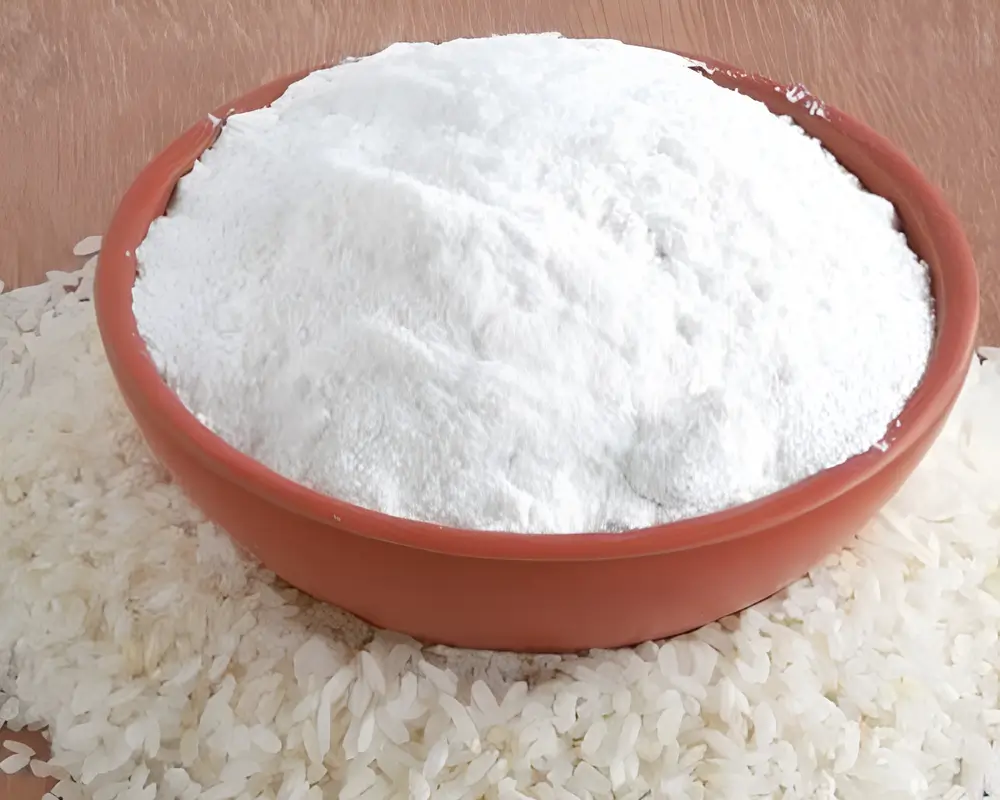
Application
Food Industry
Used in gluten-free products, as a thickening agent in sauces and soups, and in instant foods like noodles and rice cakes.
Cosmetics
Incorporated in skin care products and mineral makeup for its absorbent and exfoliating properties.
Pharmaceuticals
Serves as an excipient in tablet formulations, aiding in binding and disintegration.
Cassia Gum
Cassia Gum
Cassia gum is a natural hydrocolloid derived from the seeds of the cassia plant, specifically Cassia obtusifolia. Renowned for its exceptional thickening, gelling, and stabilizing properties, cassia gum serves as a crucial ingredient across various industries. Its ability to enhance viscosity and improve texture makes it invaluable in the food sector, where it is used in sauces, dressings, and dairy products.
As a plant-derived substance, cassia gum offers a sustainable alternative to synthetic thickeners, aligning with the growing demand for natural and environmentally friendly products. Its versatility and performance across diverse applications position cassia gum as a vital ingredient in contemporary formulation practices.
As a plant-derived substance, cassia gum offers a sustainable alternative to synthetic thickeners, aligning with the growing demand for natural and environmentally friendly products. Its versatility and performance across diverse applications position cassia gum as a vital ingredient in contemporary formulation practices.
Key Characteristics
Thickening Agent
Cassia gum is widely utilized as a thickener in food products, enhancing viscosity and texture in sauces, dressings, and other formulations.
Emulsifier
It is critical in stabilizing emulsions, preventing separation, and ensuring a consistent texture in products such as mayonnaise and salad dressings.
Anti-inflammatory & Antibacterial
Cassia powder has anti-inflammatory and antibacterial properties, which help soothe irritated skin and scalp. It effectively calms conditions like acne and dandruff, promoting a healthier scalp and improving skin tone.
Rich in Tannins & Mucilage
Cassia is rich in tannins and mucilage, which provide moisture and hydration. These compounds help lock in moisture, making cassia powder excellent for moisturizing both hair and skin, leaving them soft and nourished.

Application
Food Industry
Beyond thickening, cassia gum is employed in dairy products, baked goods, and processed foods, improving mouthfeel and overall product quality.
Pharmaceuticals
In the pharmaceutical sector, cassia gum serves as a binder and stabilizer in tablet formulations and liquid medications, ensuring uniformity and consistency.
Cosmetics and Personal Care
It is used in lotions, creams, and gels for its thickening properties, contributing to enhanced texture and improved product stability.
Textiles
Cassia gum functions as a sizing agent, improving fabric performance during the weaving process.













